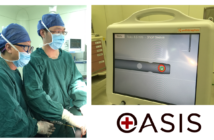Developmental milestones are guidelines to help you and your doctor determine your child’s developmental progress. “Normal” falls into a broad range, for as you know, children develop at their own pace. However, some may need that extra bit of attention early on to keep their progress on track so they won’t fall too far behind. That’s where recognizing the early signs or even “red flags” in your child’s development are very important. Research nowadays suggests early intervention to be far more beneficial to a child’s development than past “wait and see” approaches. OASIS resident Occupational Therapist Nicole Bush discusses the hows and why’s of developmental delays and what as a parent should we be looking out for?

Some research now suggests that about five to 10 percent of children have some kind of delay or learning difference. These children may not necessarily have learning disorders or disabilities, some of the time; delays may be due to the child’s environment and experiences.
For example, I’ve seen some caregivers are reluctant to put a child down on the floor especially during the cold winter months, consequently those children are then missing out on a lot of “tummy time” and experiences for their own development, therefore delaying the child from reaching their milestones at the same time as most others.
On the other hand…
 There are also children who may skip milestones all together, for example, miss out on crawling and start walking straightaway. In this case, it’s easy to overlook the value of crawling as an experience. Crawling can help children develop fine motor skills using their eye-hand coordination. Delays in this instance can show later in difficulty with handwriting.
There are also children who may skip milestones all together, for example, miss out on crawling and start walking straightaway. In this case, it’s easy to overlook the value of crawling as an experience. Crawling can help children develop fine motor skills using their eye-hand coordination. Delays in this instance can show later in difficulty with handwriting.
For more extreme developmental delays, there are some classic telltale signs parents can look out for, these are known as the “red flags”. Red flags can be significant delays in one or more areas of emotional, mental or physical growth.
Areas of developmental delay:
- Language
- Vision
- Movement (both gross and fine motor skills)
- Social and emotional skills
- Thinking (cognitive skills)
 When your child is delayed in many or all of these areas, it’s known as Global Developmental Delay. Early screening during well-child visits with your pediatrician can help discover mild motor delays or more significant disorders such as Autism Spectrum Disorder which involves significant delays in almost all areas. Early intervention can greatly improve your child’s development as they grow and help to bridge the gap that exists in their physical, social or mental capabilities.
When your child is delayed in many or all of these areas, it’s known as Global Developmental Delay. Early screening during well-child visits with your pediatrician can help discover mild motor delays or more significant disorders such as Autism Spectrum Disorder which involves significant delays in almost all areas. Early intervention can greatly improve your child’s development as they grow and help to bridge the gap that exists in their physical, social or mental capabilities.
The following “red flags” may indicate your child is at risk for an autism spectrum disorder. If your child exhibits any of the following, please don’t delay in asking your pediatrician or family doctor for an evaluation:
- No big smiles or other warm, joyful expressions by six months or thereafter
- No back-and-forth sharing of sounds, smiles or other facial expressions by nine months
- No babbling by 12 months
- No back-and-forth gestures such as pointing, showing, reaching or waving by 12 months
- No words by 16 months
- No meaningful, two-word phrases (not including imitating or repeating) by 24 months
- Any loss of speech, babbling or social skills at any age
Awareness is the best defense against developmental delays. Be aware of what milestones your child should be hitting and aware of any odd behaviors they may be displaying. A picky eater on its own may be nothing, but if they are a picky eater, who also freaks out over nail clippings and haircuts or any other sensory experiences like sound and fabric textures, you may be looking at the early signs of a developmental disorder and should think about talking to your pediatrician about an evaluation for your child.
How Might Occupational Therapy Help?
Nicole Bush as a Pediatric Occupational Therapist focuses on the child’s performance and helps them acquire the skills they need to succeed in daily living and school. This can be helping children learn to hone in on their fine and gross motor skills which they need for everyday activities (for example: handwriting for school) and movement through play and activities. Through the use of purposeful activities, OT is able to promote health, technique and functional outcomes in many areas of life. For autistic children, sensory regulation deficits can also be helped through OT.
Nicole is a registered Occupational Therapist certified with the National Board of Certification in Occupational Therapy (NBCOT) in the United States. She has earned both her Bachelor’s Degree in Science and Master’s Degree from Texas Tech University. Nicole has worked with children in a variety of settings including outpatient clinics, school systems, and home health. She has worked with children with a variety of diagnoses including, but not limited to, autism spectrum disorders, ADHD, cerebral palsy, Down syndrome, spinal cord injury, developmental delay, sensory processing disorder and fine motor coordination disorder.
Nicole Bush has over 13 years of experience as an occupational therapist specializing in pediatric occupational therapy. She has been trained and has experience with Sensory Integration, Neurodevelopmental Treatment (NDT), Therapeutic Taping, Brain Gym, and Handwriting without Tears.
To setup an appointment with Nicole Bush, call: 400-8762-747
or ask for a referral from OASIS Pediatrician.
This post is sponsored by OASIS International Hospital
Photos: OASIS



